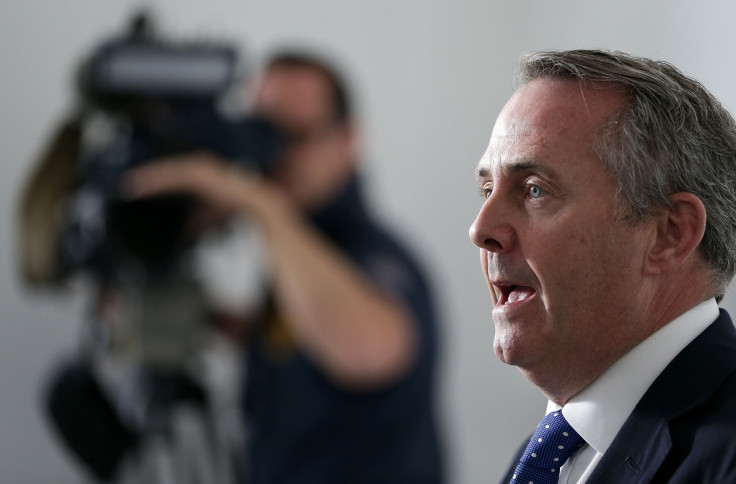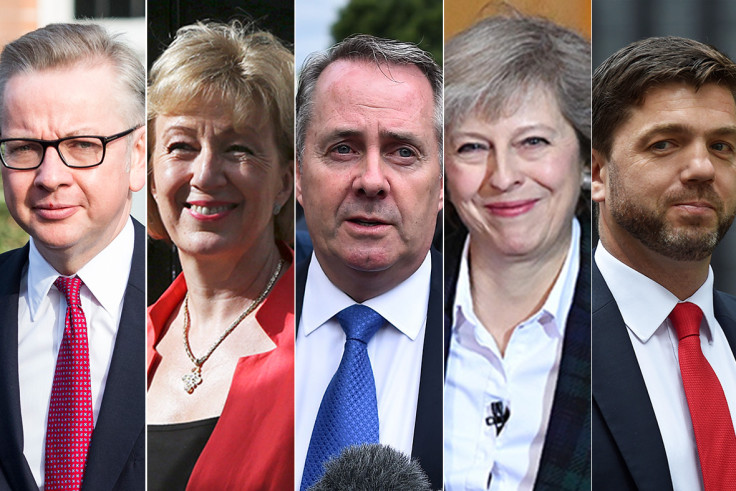Liam Fox speech in full: 'I would like to see us leaving the European Union on 1 January 2019'
Tory leadership candidate would set clock ticking for Britain to leave the EU.

Most Conservative leadership contests in recent years have been in opposition, where the winner has several years to play themselves in before taking up the reins as Prime Minister. This one is different; the successful candidate will be in Number 10 by early September.
This is not a political parlour game. The winner of this contest, on day one, will be asked to set out the instructions for the use of our nuclear deterrent. They will receive a call from Mr Putin and be expected to drive our international policy against the threats of Islamist extremism including in the Middle East. This is not the political equivalent of Britain's got talent – it matters.
Today, subsequent to my campaign launch last Thursday, I want to set out my own priorities for the immediate future. Most of our programme for government will set out in a manifesto for the 2015 General Election which is why we will not require another election following this leadership contest. But there are differences in emphasis and priority within those programs.
Let me begin with national security. We need to increase our defence spending. I have found it extremely difficult to justify why a Conservative government would increase the aid budget but reduce the defence budget. In particular, we need to look at the size of the naval surface fleet at a time when we have an increased challenge from people smugglers and the imminent arrival of our carriers which will require proper protection.

We also need to increase our capability in cyber defence in what I have called "the War of the invisible enemy". Not only is cybercrime and cyber espionage a major threat to our financial institutions but the risk of cyber terrorism, including threats to critical national infrastructure such as electricity generation, is on the rise to an extent threatens our national security.
This brings me to my next, and related, point. We must end the culture of indecision which is seemingly endemic at the present time. The long grass is full to overflowing.
Investment requires certainty and confidence. Too many decisions have been put off for reasons of political expediency in recent times. Not everyone will agree on every decision but being in office is not enough – we need to govern.
The first of these is essential for our national security – the renewal of our trident nuclear deterrent program. This should not be used as a political football, or a tool against Labour in Parliament. National security is too important and a decision needs to be taken at the earliest opportunity.
There are three other programs that also require a quick decision about their future.
Clarity needed over HS2 project
We urgently need more runway capacity in London. The delays in making a decision, usually for political reasons, have been scandalous. I personally favour development of a third runway at Heathrow which I know will not be universally popular. We must have the courage to see the bigger picture, and implement the decision as soon as possible.
Likewise, we need clarity over HS2. There is no doubt that we need better connectivity, reliability and capacity but I'm not convinced that we need to be spending an inordinate amount of money and time getting the straightest track so that we can have the fastest trains possible.
I'm in favour of the project progressing so that we can get better connections to the north of the country and, even more importantly, get more freight off our roads and onto rail. But I believe we can avoid both planning blight and inordinate expense if we downgrade our obsession on speed. A final decision must be taken and implemented without delay.
When it comes to energy policy I believe it has been reckless to reduce generating capacity from fossil fuels before we have had the ability to replace it. I'm fully in favour of nuclear as part of the energy generation mix which is why I have been in favour of the development of Hinkley C in Somerset, not far from my own constituency.
However, I have grave doubts about using an on proven and untested reactor type whose costs are escalating to a phenomenal extent. We need to reassess whether we need to switch to reactors that have already shown their viability in practice for economic, security and energy reasons. This needs to be done immediately.

On planning and housing, we are still failing to build the number of houses that we require to deal with demand. We need greater incentives to build on brownfield sites, especially in areas where there is demand close to the workplace.
We also need to ensure that, in providing more housing, we are not damaging the quality of life for those who already live in the vicinity. I would therefore like to see a new duty on local authorities to conduct an infrastructure assessment (on school capacity, GPs and roads) before planning permission is given adjacent to existing development.
I would also like to see a "use it or lose it" provision introduced so that developers must actually build on land within a specified time or lose the development permission. All of these are practical issues which need to be addressed urgently but there are also more subtle changes that we need to make to the management of public policy.
Stop fiddling with the NHS
The first is to stop fiddling with NHS structures. We all understand the need to get efficiency within the system but constant restructuring has been expensive, time-consuming and demoralising. If we want to get control over NHS spending, then we need to get control over the cost drivers in the system. I believe that medicine, not management is the key to this. For example, diabetes (in all its manifestations) is the biggest cost to our National Health Service today.
We need a proper thought out and nationally executed program for early diagnosis, treatment and education if we are to prevent phenomenal costs from developing in the future.
Likewise, we need to identify failures in healthcare that are leading to increased costs elsewhere. One of the most obvious areas is mental healthcare, where failure is costly in days lost to work, in inappropriate placement in the criminal justice system and the tragic loss of human life.
As a doctor, I have seen the failure to move from the old inappropriate institutions we had, to a much more enlightened approach to mental health issues with great sadness. We have taken people from one form of institution and placed them in another. Most MPs have witnessed the costs of failing to provide the genuine alternative of care in the community. How we treat some of the most vulnerable people in our society is a testament to the decency and values in our society.
It is a test that we are failing when it comes to mental health and it must change. If we are to deliver on our promises then we must have ring fencing of the mental health budget within the NHS, something we have so far refused to contemplate.
Perhaps the greatest challenge facing the incoming Prime Minister will be how we deal with our exit from the European Union. The decision taken by the British people was both historic and courageous.
No backsliding
The can be no backsliding on this issue and no question of a second referendum. It is quite clear that the public rejected the concept of free movement of people and it would be a betrayal to entertain any trade deal where this was the price to be paid.
We have nothing to fear from a more free-trade environment. Investment will continue to come to the United Kingdom because our contract law guarantees certainty and security. We have a skilled workforce with low levels of industrial disruption.
We have a low regulation and low taxation environment which is only likely to improve outside the EU. We have some of the best universities in the world, we speak English and we are in the right time zone for global trading. All of these point to an optimistic and confident future.
We will activate the Article 50 process before the end of this year. We cannot lose momentum and risk the derailing of the British people's decision by stealth.
We need to recognise that we are likely to be frustrated by the ideological rigidity of the commission, as exemplified by the ridiculous position taken by the trade Commissioner last week. For those of you who missed the pantomime, she said that no negotiations could take place with United Kingdom on a future trading relationship until the UK had left the EU. She was subsequently asked if this would not be detrimental to all the economies in Europe. She said "yes, but that is what the British voted for".
I cannot imagine a more stupid approach. We will need to talk to our main trading partners in Europe, the elected governments, about how we will move forward in our mutual interests. It is not in our interests to see an unnecessary dislocation in trade around Europe and we must, in the two years remaining in the EU, encourage others to tackle the zealotry of the unelected bureaucrats of Brussels whose disregard for the ordinary citizens of Europe is putting the stability of the whole continent in jeopardy.
Britain needs to be strategic
Finally, we need to remember that there is a big world outside the EU. We need to think about our place in the world in a strategic, not tactical, way. British values of democracy, freedom and the rule of law have transformed much of our world and we should take pride in our history, rather than apologising for it.
The era of globalisation could have been created for the values and attitudes of the British people. We need to see a reinvigoration of our transatlantic relationship, as well as an upgrade to the relations we have with our Commonwealth neighbours. They have been neglected for too long, while we have obsessed over the failing European Union. The foreign office can no longer be the EU embassy in Whitehall, but needs to be at the centre of a confident and optimistic view of Britain in the world.
We will need to recreate the ability to manage trade and trade organisations outside the EU. I want to see it incorporated into a new foreign and trade department where our foreign and trading policy will be more closely aligned. I want to see two cabinet ministers represent this department, in the same way that the Treasury currently has two cabinet ministers. This will make clear the importance of we give to this function of government, and will be an important counter-balance to the Treasury's influence in Whitehall.
I set out these measures because I believe there has been too little focus on the practical in this leadership discussion so far.
Having worked as a minister in the foreign office, the Treasury whip, shadow health secretary, Conservative party chairman, shadow Foreign Secretary and Secretary of State for defence, I believe I bring the breadth of experience necessary to oversee the changes we will require.
I have sat round the table with the American president, Chancellor Merkel and others. I have strong links politically in Washington at the time when we will need to develop a strong relationship with the incoming administration. I have visited our troops in the mountains of Afghanistan and the deserts of Iraq. The first duty of government is the security of its people. To that I am fully and unequivocally committed.
Politics is not a game.
© Copyright IBTimes 2025. All rights reserved.





















